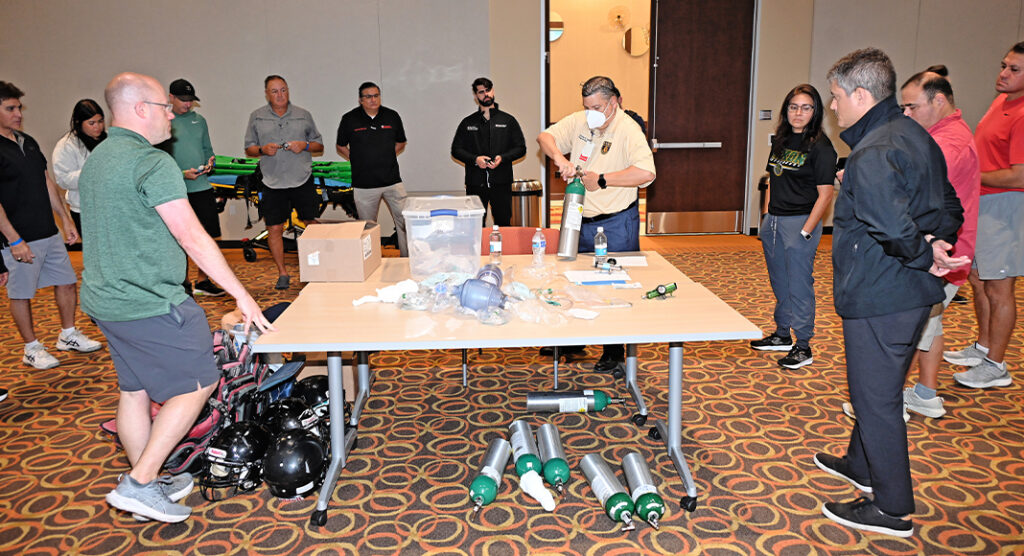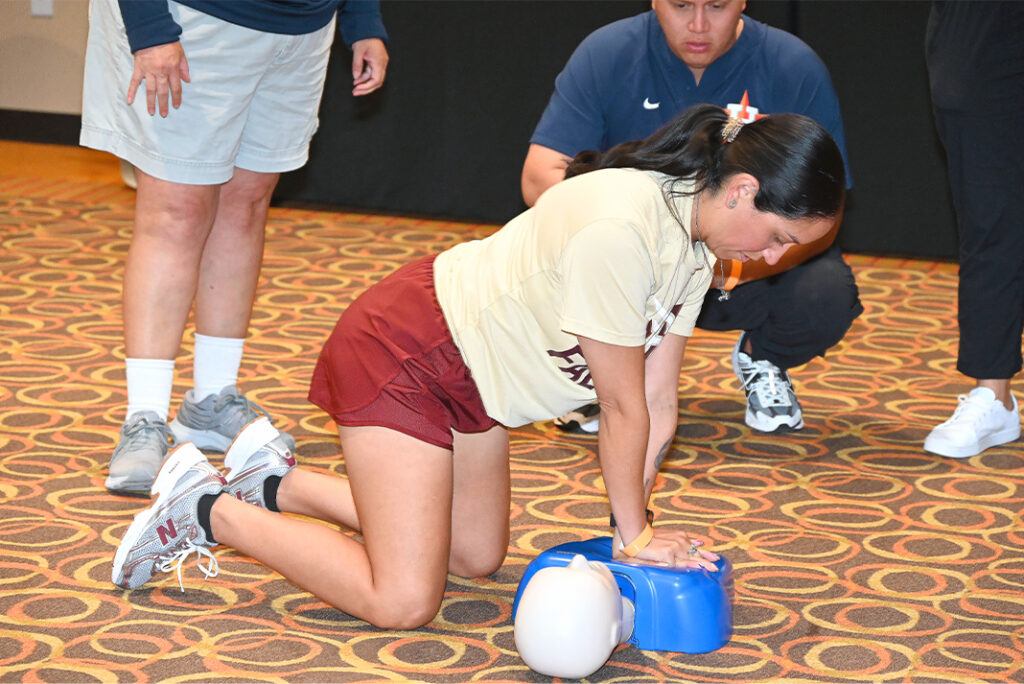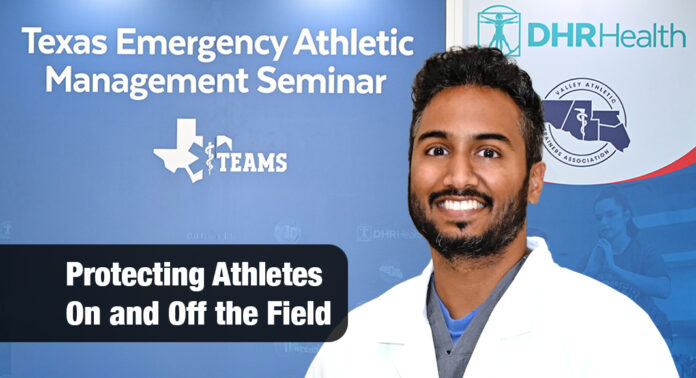Mega Doctor News
By Roberto Hugo González
Dr. Sujan Gogu, DO, participated in the 3rd Annual Texas Emergency Athletic Management Seminar (TEAMS), hosted by DHR Health and the Valley Athletic Trainers Association in Edinburg. The two-day event brought together physicians, athletic trainers, nurses, and EMS professionals for a shared mission: protecting student-athletes through education, preparation, and collaboration. Among the distinguished presenters was Dr. Gogu, a Sports and Pain Medicine specialist whose passion for both medicine and athletics was evident from the moment he spoke.
At TEAMS, Dr. Gogu emphasized the importance of preparation. “Hands-on workshops are vital,” he said. “You can’t practice cardiac arrest with a real patient—you can only prepare through scenarios. That preparation can make all the difference in outcomes.” His message underscored the very spirit of the event: saving lives and improving safety through teamwork.

Dr. Gogu has served at DHR Health in McAllen for the past two years, but his connection to the Rio Grande Valley runs deeper. “I’ve been in the Rio Grande Valley for about five years now,” he explained. “I was at another health system for two years, another for one year, and now here at DHR Health for the last two years.” His decision to stay in the Valley, despite opportunities elsewhere, reflects a conviction that the community deserves access to specialized care and advocacy for safer sports environments.
His background as an athlete informs his perspective. “My training was influenced by my own time as an athlete,” he recalled. “I was an avid tennis player growing up. I played at the super champ level in Texas. I always understood the struggles athletes face, and I wanted to be able to help them overcome those struggles and continue doing what they love.”
Living and working in South Texas has also given him a sharp awareness of the region’s challenges. Nearly 40 percent of RGV residents live in poverty, while many others face barriers such as undocumented status, unsafe housing, or limited access to clean water and nutritious food. “In medicine, we call these the social determinants of health,” he explained. “Unfortunately, in the Valley, these factors don’t add up well for many patients, and they often come to us very sick.”
Those disparities show up on the playing field, too. Limited resources, heat, and environmental risks put young athletes at greater risk of both injury and long-term health problems. “On the sideline of a game, you’re not just taking care of the athlete on the field,” he said. “You could be helping the coach, someone in the stands, or even a family member. If there’s a cardiac arrest in the bleachers, you can’t say, ‘I’m only here for the athletes.’ You’re there to care for everyone.”

His expertise spans a wide range of emergencies—concussions, fractures, dislocations, heat stroke, and cardiac events. “You have to have the skill set to stabilize an individual and get them where they need to go,” he said. “You can save a life.”
Preventable injuries are another concern. “In football, tackling headfirst instead of using proper technique puts athletes at higher risk of concussions,” he explained. “In South Texas, heat exhaustion and heat stroke are big risks, especially during El Niño years. In baseball and softball, kids are pitching excessively, leading to shoulder injuries. We have to enforce guidelines to protect them.”
Each sport, he stresses, requires its emergency action plan. “Football requires a much larger infrastructure—athletic trainers, AEDs, trauma kits, even tents,” he said. “Tennis and golf are more prone to heat exhaustion, while track athletes are more likely to suffer sprains and stress fractures. Each sport has its own set of risks, and we need to be prepared for them.”
Technology, too, is changing the field. Guardian caps and improved helmets are helping to reduce concussions, while wearable devices offer real-time monitoring of heart rhythms and exertion. “The more data points you have, the better you can train and protect athletes,” he said. “The challenge is that this technology is expensive, and many schools in the Valley don’t have the budget for it. But hopefully, in time, these tools will become more accessible.”
Beyond physical health, Dr. Gogu is deeply concerned with mental health in youth sports. Athletic trainers, he said, are often the first to notice when something is wrong. “Trainers are sometimes the first to recognize depression, anxiety, or even issues like abuse or ADHD,” he said. “One of the easiest signs is a sudden loss of interest in a sport the athlete once loved. But the only way you’ll really know what’s going on is if the athlete trusts you enough to open up. Building that relationship is critical.”
Dr. Gogu’s academic and clinical journey has prepared him for this mission. He earned his undergraduate degree from the University of Texas at San Antonio, majoring in biology and minoring in mathematics, before attending the Edward Via College of Osteopathic Medicine in Virginia. He completed his residency in Family Medicine at the UT Health Science Center in San Antonio, followed by a Sports Medicine fellowship at Texas A&M University in College Station and a Pain Medicine fellowship at the Texas Pain Institute in Fort Worth. Today, he is triple board-certified and recognized for his expertise in both musculoskeletal care and complex pain management.
His work with Team USA at Colorado Springs reinforced his commitment to concussion awareness. “Head injuries and concussions are taken very seriously at that level,” he explained. “The concern isn’t just what happens in the moment, but the long-term consequences—dementia, Parkinson’s, or CTE from repetitive head trauma. We need to recognize that untreated injuries today can impact not only health but also a person’s ability to work and support themselves decades later.”
Collaboration is central to his philosophy of care. At DHR Health, he maintains close communication with athletic trainers, often making himself available around the clock. “I’ve given my cell phone number to every trainer I work with,” he said. “That openness and communication allow us to streamline care much faster and avoid the risks of fragmentation.” He points to the case of Miami Dolphins quarterback Tua Tagovailoa, who suffered another head injury after being cleared too soon, as an example of what can happen when collaboration breaks down.
For Dr. Gogu, the TEAMS conference was another chance to strengthen those connections. The event combined expert presentations with hands-on skills labs, providing athletic trainers and medical professionals with tools to respond to emergencies in youth sports. “This conference brings to life the real-world collaboration required among all medical professionals when responding to athletic injuries,” said Dr. Noel Oliveira, Wound Care Specialist and DHR Health Chairman of the Continuing Medical Education Committee.
But for Dr. Gogu, the work goes even deeper. “Athletic trainers aren’t just picking up sprains or concussions,” he said. “They’re identifying depression, anxiety, or problems at home. They play a huge role in protecting kids. If we keep our children healthy through high school, it impacts the economic strength of our entire community. Healthy kids grow into healthy adults who can contribute to society.”
In his dual role as physician and advocate, Dr. Sujan Gogu demonstrates how healthcare can extend far beyond the exam room. Whether on the sideline of a football game, in a classroom at TEAMS, or in the clinic at DHR Health, his mission is clear: to protect athletes on and off the field, today and for the future.
See related Story:









